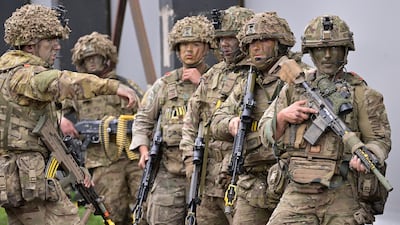As the war in Ukraine enters its fifth month, British troops must prepare “to fight in Europe once again”, the new head of the army has said.
In a letter to his charges this week, Gen Sir Patrick Sanders outlined the challenges facing the military after the Russian invasion, stressing the “imperative” to build an army that could defeat Russian troops.
“There is now a burning imperative to forge an army capable of fighting alongside our allies and defeating Russia in battle,” said Sir Patrick, who took over as the army’s chief from Gen Sir Mark Carleton Smith on Monday.
“We are the generation that must prepare the army to fight in Europe once again,” he said.
Sir Patrick said he was the “first chief of the general staff since 1941 to take command of the army in the shadow of a land war in Europe involving a continental power”.
“Russia’s invasion of Ukraine underlines our core purpose to protect the UK by being ready to fight and win wars on land,” he said.
His comments follow Prime Minister Boris Johnson's warning after he returned from a visit to Ukraine that “we need to steel ourselves for a long war”.
Mr Johnson, who met President Volodymyr Zelenskyy in Kyiv on Friday, said that the Russian invasion is “entering a new phase” and, if its military is successful, President Vladimir Putin “would not stop at dismembering Ukraine”.
“I am afraid that we need to steel ourselves for a long war, as Putin resorts to a campaign of attrition, trying to grind down Ukraine by sheer brutality,” Mr Johnson wrote in The Times.
Last year, the government set out plans to reduce the target size of the regular army from 82,000 personnel to 72,500 by 2025.
The reduction would mean the smallest British Army since 1714. Downing Street is said to be looking to model its military on smaller units supported by better technology and increased electronic warfare capabilities.
“Everything will depend on whether Ukraine can strengthen its ability to defend its soil faster than Russia can renew its capacity to attack,” Mr Johnson said.
“Our task is to enlist time on Ukraine's side.”
Mr Johnson set out a four-point plan to provide military assistance, including ensuring Ukraine “receives weapons, equipment, ammunition and training more rapidly than the invader”, providing “constant funding and technical help”, and developing alternative overland routes to overcome the Russian blockade on ports in Ukraine.
The prime minister also said the UK would aim to work with allies to train up to 10,000 soldiers every 120 days to support Ukraine.


